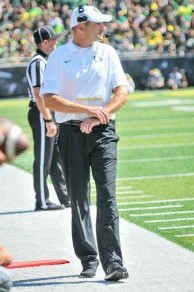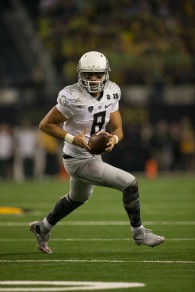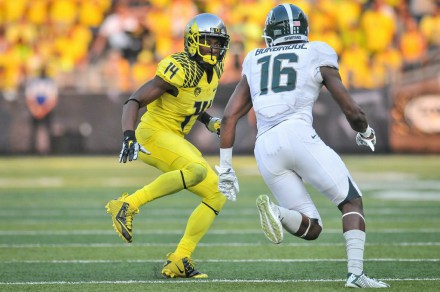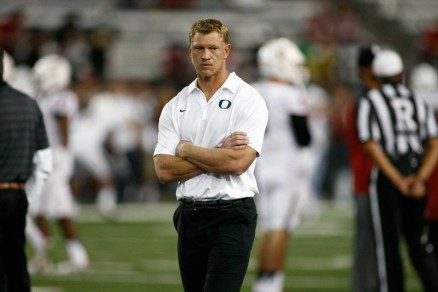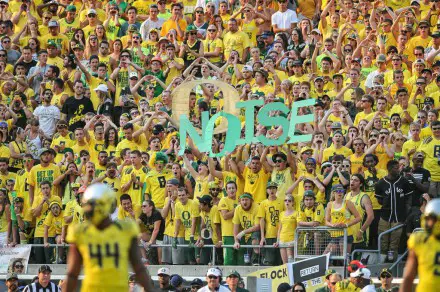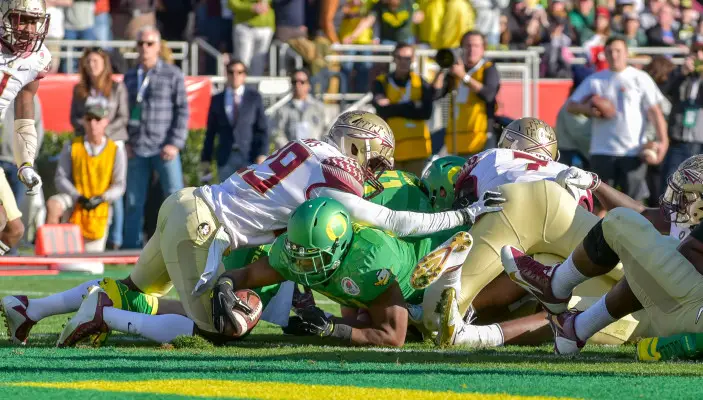
Florida States win streak came to a screeching halt in the Rose Bowl.
Over the past five seasons, no college football team has performed better than Oregon.
That is not an opinion. The Ducks have lost only eight games in five seasons and have won 60 in that same period. Not even Alabama can match Oregon’s winning percentage since the beginning of 2010.
But Oregon is…different. The Ducks operate faster than other teams. They’re better dressed than other teams. They win in ways that have rarely worked before, in ways that many would say shouldn’t work, or don’t work, despite overwhelming evidence to the contrary. Oregon’s very nature attacks the conventional old-school, smash mouth style of football beloved by so many.
In some ways, the traditional style rules college football. It forms a comfort zone for fans, players, coaches and analysts everywhere. Because this tradition is rooted so deeply in the culture of college football, Oregon is a pariah that represents an unwelcome change. History has taught us that an unfortunate side effect of being different is that it creates fear and anxiety, and can therefore be mistaken for some sort of vague inferiority.
In the Ducks’ case, the fear has become so palpable that an outsider would never know the team’s success, considering the way it is often viewed in the college football world. For example, in the weeks leading up to the 2015 National Championship game the narrative was simple: it was championship or bust for Oregon. The Ducks needed to secure a national title to validate the success of the program.
You know, kind of like how nothing that Peyton Manning, Andrew Luck, Tommy Frazier, Jim Brown or John Elway did in college was ever that great because none of them ever won a Heisman Trophy.
Unfortunately, Oregon fell to Ohio State on Monday night in a matchup that was a perfect microcosm of the ongoing fight between tradition and innovation, past and future. As a result, Oregon’s one tangible shortcoming as a program is applied to its success as a whole. And so the Ducks remain in college football’s “other” category, where they continue to be stereotyped as much as they are honestly evaluated.
It’s an easy trap to fall into. After all, Oregon’s up-tempo spread offense, sleek uniforms and innovative schemes are unique and unfamiliar. When you don’t fully understand something it is hard to really appreciate its nuances, and all of the details get blended together into one generic image.
However, we’ve reached a point where this lack of familiarity has turned into a lack of respect. There has perhaps been no larger disparity between truth and myth regarding any single team in any sport than the one regarding Oregon football. Now that the Ducks have fallen just shy of a national title for the second time in five years, it’s time that these myths are finally examined and refuted, once and for all.
“Oregon can’t win the big game.”
Oregon has now lost in two national title games. However, since the start of the 2010 campaign, they are a national best 17-4 in games against teams that were ranked in the AP Top 25. Before falling to Ohio State, the Ducks had won six recent post-season games by an average margin of 23.6 points.
This myth initially stemmed from Oregon’s 22-19 loss to Auburn in the national title game following the 2010 season. It’s often overlooked, however, just how close that game was, which brings us to the next myth of Oregon football.
“Oregon can’t play defense.”
When Auburn defeated Oregon back in 2011, Cam Newton had already annihilated the SEC, a conference that represents, perhaps better than any other, the traditions of great defense and physical play. While the Ducks did fall as well, their “soft” defense held Newton’s offense to its second-lowest point total that year, outdoing each SEC team on Auburn’s schedule except Mississippi State.
Due to Oregon’s pace on offense, the Ducks’ defense spends more time on the field than almost any other team. Therefore, it is not exactly appropriate to look at total yardage or scoring stats to judge them. Oregon has not finished higher than 34th nationally in total defense per game since the beginning of the 2010 season.
However, it has finished no lower than 35th nationally in defense per play every year between 2008 and 2013, including three Top-12 finishes. This value gives a much better idea of how the Oregon defense actually performs, as its total numbers will always be inflated by time of possession.
Like the offense, Oregon’s defense is full of playmakers. The Ducks’ high turnover margin was no fluke in 2014, as the team has finished in the Top-20 in takeaways in each of the past five seasons, including three Top-3 finishes in that time.
“Oregon only wins because of its system.”
As a coach, if you don’t have a system, you don’t have a job. When people belittle Oregon’s “system,” they are referring to its up-tempo spread offense, which is similar to dialing up a blitz on defense, running a full-court press in basketball, or sprinting to first base instead of jogging. The idea is to put as much pressure on the opponent as possible.
The negative perception of Oregon’s scheme as somehow “gimmicky” implies some sort of unfair advantage. In fact, SEC coaches Nick Saban and Bret Bielema have both argued that the up-tempo offense is unfair and could even lead to player injuries.
This attempt to push Oregon’s scheme out of football demonstrates, perhaps better than anything, the fear of the Ducks’ new style, for only fear could turn Oregon’s dominant offensive strategy into a knock on the team.
Saying that the Ducks only succeed because of their system is the same as saying “Oregon only succeeds because its innovative coaches are brilliant offensive minds and its well-conditioned players execute to perfection.” If it’s just the system, why doesn’t every team run it and get a free 45 points per game?
“Oregon will always lose to physical teams.”
Every team that Oregon has lost to over the past five years has been able to gain an advantage in the trenches. Auburn’s Nick Fairley was a headache in the middle for the Ducks, and dominant rushing attacks led by the offensive lines of LSU, Stanford, Arizona and Ohio State have given them trouble.
This pattern is so strong in Oregon’s losses that it’s easy to forget that those eight losses were only 11 percent of the team’s games over that span. Every team has a kryptonite. Even Alabama’s defense has had trouble with fast-paced spread offenses such as the Johnny Manziel-led Aggies, or Auburn under Gus Malzahn.
In 2014, Oregon posted a combined 91 points on two elite defenses in Michigan State and Stanford. (Both finished in the Top 8 in total defense.) Later that year, Thomas Tyner gashed Florida State’s defensive line, led by studs Mario Edwards and Eddie Goldman, who many thought would out-physical the Ducks, and the Oregon defense allowed only 25 total first-half yards to Arizona in the Pac-12 Championship game.
Yet the team’s one weakness is still used as a weapon to invalidate the Oregon way in its entirety. The Ducks usually make every play look so easy and every win so convincing that when they slip up, it feels like the sky is falling.
Ohio State’s 296 rushing yard game against Oregon wre not exactly unique. Ezekiel Elliot and the Buckeyes did the same level of damage to three Top-25 defenses in Michigan State, Wisconsin, and Alabama. In fact, the Ducks allowed Ohio State fewer yards per carry than any of those three teams did.
Before facing Ohio State, Oregon was 13-1. It had played six ranked teams and defeated five of them. It won by an average margin of 24.9 points. It fought through injuries to its top receiver and left tackle before the start of the season, and then to its All-Americans at cornerback and tight end, and finally lost another receiver down the stretch. Even so, the Ducks beat the defending champions, a team that hadn’t lost in more than two years, by 39 points.
In a normal year, that sounds like a storybook national championship season.
But, like Oregon, this year was different. Ohio State finished off a remarkable year by defeating the Ducks in the first College Football Playoff, and the Buckeyes truly deserve all the credit in the world for their success.
Still, for the Ducks it was bigger than this season. It was about proving that Oregon, that unconventional pest out West, was here to stay. It was about disproving the myths that have plagued UO’s reputation for years. With a national title, the ongoing argument would have been won.
But the argument will continue. The fight between comfort and change will continue. That one elusive accolade is, at least to a certain extent, arbitrary when considering the success of the Oregon program. Oregon fans, players, and coaches know that the myths have been debunked and that the Ducks are here to stay. Eventually, everyone will know the same.
Top Photo by Kevin Cline
Related Articles:
Joey Holland graduated from the University of Oregon in 2013, majoring in History. He played several sports in high school, though football remains his passion. He has yet to miss a single Oregon Ducks home football game during his time in Eugene. Joey has written previously for Bleacher Report and Football Nation.
Joey welcomes your feedback.

